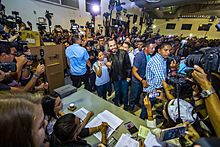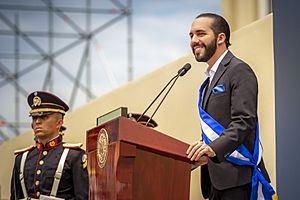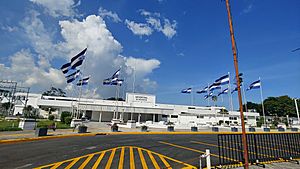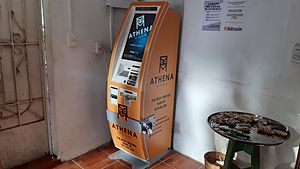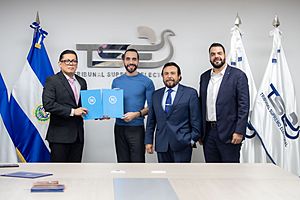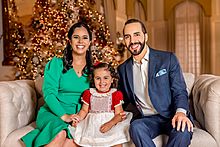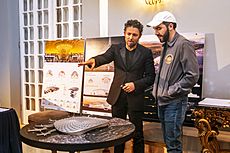Nayib Bukele facts for kids
Quick facts for kids
Nayib Bukele
|
|
|---|---|
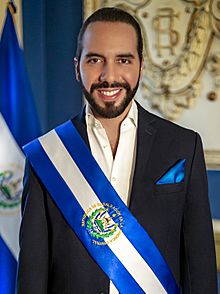
Official portrait, 2019
|
|
| 43rd President of El Salvador | |
| Assumed office 1 June 2019 Claudia Rodríguez de Guevara Acting since 1 December 2023 |
|
| Vice President | Félix Ulloa |
| Preceded by | Salvador Sánchez Cerén |
| 13th Mayor of San Salvador | |
| In office 1 May 2015 – 30 April 2018 |
|
| Preceded by | Norman Quijano |
| Succeeded by | Ernesto Muyshondt |
| Mayor of Nuevo Cuscatlán | |
| In office 1 May 2012 – 30 April 2015 |
|
| Preceded by | Álvaro Rodríguez |
| Succeeded by | Michelle Sol |
| Personal details | |
| Born |
Nayib Armando Bukele Ortez
24 July 1981 San Salvador, El Salvador |
| Political party | Nuevas Ideas (since 2017) |
| Other political affiliations |
|
| Spouse |
Gabriela Rodríguez
(m. 2014) |
| Children | 2 |
| Education | Central American University (no degree) |
| Cabinet | Cabinet of Nayib Bukele |
| Signature | |
Nayib Armando Bukele Ortez ( born 24 July 1981) is a Salvadoran politician and businessman who is the 43rd president of El Salvador, serving since 1 June 2019. He is the first president since José Napoleón Duarte (1984–1989) not to have been elected as the candidate of one of the country's two major political parties: the left-wing Farabundo Martí National Liberation Front (FMLN) and the right-wing Nationalist Republican Alliance (ARENA).
Bukele served as mayor of Nuevo Cuscatlán for three years from 2012 to 2015, and then served three years as mayor of San Salvador, the nation's capital, from 2015 to 2018. After winning both mayoral elections as a member of the FMLN, Bukele was expelled from the party in 2017. In 2018, he established his own political party: Nuevas Ideas. He sought to win the 2019 Salvadoran presidential election with the center-left Democratic Change; as the Supreme Electoral Court (TSE) dissolved Democratic Change, Bukele instead ran with the center-right Grand Alliance for National Unity (GANA). He won the election with 53 percent of the vote.
El Salvador's murder rate has decreased during Bukele's presidency. Bukele's war on gangs was credited as effectively crippling them, resulting in a nearly 60 percent decrease in homicides in 2022. The campaign led the country to have the highest incarceration rate in the world as of 2023, and garnered accusations of human rights violations being committed by El Salvador's security forces. However, the homicide rate decreased by 70 percent in 2023 to 2.4 per 100,000, a record low below almost any other country in Latin America.
Bukele has maintained record high approval ratings of around 90% among Salvadorans throughout his tenure. He has been accused of sometimes governing in an authoritarian manner. In February 2020, Bukele sent soldiers into the Legislative Assembly in an effort to coerce the passage of a bill that would fund additional purchases of equipment for the police and armed forces. In May 2021, he led a move to fire the attorney general and five supreme court judges of El Salvador, which the United States Department of State and Organization of American States (OAS) denounced as democratic backsliding. Following the approval of bitcoin in El Salvador as legal tender in September 2021, protests against Bukele's government took place. His announcement that he would run in the 2024 Salvadoran general election led to criticism by constitutional law experts and organizations that immediate presidential re-election violates the country's constitution. The last president to seek re-election was Antonio Saca in 2014 and the last incumbent president to be successfully re-elected was Maximiliano Hernández Martínez in 1944. President Bukele and Vice President Ulloa had their powers and duties suspended on 1 December 2023 in order to focus on their re-election campaign and Claudia Rodríguez de Guevara assumed Bukele's powers and duties as acting president.
Contents
Early life and education
Nayib Armando Bukele Ortez was born on 24 July 1981 in San Salvador. He is a son of Armando Bukele Kattán and Olga Ortez de Bukele. Bukele's paternal grandparents were Palestinian Christians from Jerusalem and Bethlehem while his maternal grandmother was Catholic and his maternal grandfather was Greek Orthodox.
Bukele studied law at the Central American University, but later ended his studies and founded his first company at age 18 and took over family businesses. According to a 2017 article in the digital newspaper El Faro, Bukele owned Yamaha Motors El Salvador, a company that sells and distributes Yamaha products in El Salvador. He was also the director and president of Obermet, S.A. de C.V., a marketing agency, in 2011.
Early political career
Mayor of Nuevo Cuscatlán
On 11 March 2012, he was elected mayor of Nuevo Cuscatlán, in the department of La Libertad, representing a coalition of the Farabundo Martí National Liberation Front (FMLN) with 2,754 votes (49.72%) and Democratic Change (CD) with 108 votes (1.95%), for a total of 2,862 votes (50.68%), defeating the incumbent Nationalist Republican Alliance (ARENA), which won 2,585 votes (46.67%). He took office on 1 May 2012.
During his term, he donated his salary to the scholarships that he was offering for youths in Nuevo Cuscatlán. On 21 January 2015, Bukele inaugurated a new boulevard which connected Nuevo Cuscatlán with Huizúcar and Antiguo Cuscatlán. Bukele performed much of his works as mayor with funding from ALBA Petróleos, an association owned by the Venezuelan oil company PDVSA.
Mayor of San Salvador
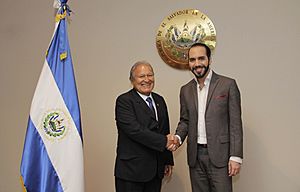
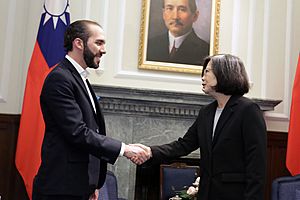
In the municipal elections of 2015, he won the mayoralty of San Salvador, the capital city of El Salvador, representing a coalition of the FMLN and the Salvadoran Progressive Party (PSP) that won 89,164 votes (50.37% of total). His main challenger, businessman and former ARENA deputy Edwin Zamora in a coalition with the National Coalition Party (PCN), received only 82,288 votes (46.49%). The latter party had controlled the city during the previous six years. Bukele took office on 1 May 2015.
Upon taking office, Bukele reverted the names of two streets in San Salvador: Calle Mayor Roberto D'Aubuisson to Calle San Antonio Abad A La Vía and Boulevard Coronel José Arturo Castellanos to Boulevard Venezuela. Both names were changed by his predecessor, Norman Quijano, during his term, the former being named after Major Roberto D'Aubuisson, who ordered the assassination of Archbishop Óscar Romero in 1980 during the Salvadoran Civil War and founded ARENA in 1981, and the latter being named after Colonel José Castellanos Contreras, who saved 40,000 Jews from the Holocaust in Central Europe by providing them fake Salvadoran passports. Bukele began his "revitalization" of San Salvador with the relocation of street sellers, a change which was positively received by the public and the media. He also built the Cuscatlán Market and San Salvador's first municipal library.
In February 2017, Bukele visited Taipei, the capital of Taiwan, and met Taiwanese President Tsai Ing-wen to "enhance" the sister city relationship between San Salvador and Taipei. In February 2018, he attended the 32nd International Mayors Conference in Jerusalem, where he was seen praying at the Western Wall, and revealed that his wife's grandfather was a Sephardic Jew. During the last months of his term, Bukele brushed up the historic center of San Salvador by expanding roads, remodeling buildings, and rebuilding electric and telecommunication lines, all costing around $5.7 million.
Expulsion from the FMLN
On 10 October 2017, Bukele was expelled from the FMLN, accused by the FMLN Ethics Tribunal of promoting internal division within the party, verbally and physically attacking fellow party member Xóchitl Marchelli, performing defamatory acts against the political party, and heavily attacking and criticizing incumbent FMLN President Salvador Sánchez Cerén. Bukele did not attend the hearing scheduled for 7 October 2017 by the FMLN Ethics Tribunal, arguing that they were biased in favor of the plaintiffs. The FMLN lost 20 municipalities and 8 seats in the Legislative Assembly in the subsequent 2018 legislative election. Some political experts have speculated that the losses were in part due to the expulsion of Bukele from the FMLN.
Election as president
After Bukele's expulsion from the FMLN, his aspirations towards 2019 moved in the direction of participating in the presidential elections as an independent who rejects the current political system. He had wanted to run for president as a member of the FMLN; however, resistance from party leadership prevented him from doing so. He established the political party Nuevas Ideas ("New Ideas") with the goal of making it a political party where he could run as a candidate for the presidency of El Salvador.
Following the announcement of his presidential aspirations, he was opposed by both the ruling FMLN party on the political left, and ARENA on the political right, as they blocked any attempts for him to found his own political party and politically canceled any party that he has attempted to use for his candidacy, as they did so with Democratic Change. His attempt to run with the party ended when the Supreme Electoral Court (TSE) effectively dissolved the party. Bukele eventually joined the center-right Grand Alliance for National Unity (GANA) party to mount his presidential bid.
On 3 February 2019, Bukele announced that he had won the presidential elections with ease. Challengers Carlos Calleja of the ARENA and Hugo Martínez of the FMLN conceded defeat. He won 53 percent of the vote, thereby eliminating the need for a run-off election. He is the first candidate to win the presidency since the end of the Salvadoran Civil War who did not represent either of the major two parties. In his victory speech he declared, "Today we have turned the page on the postwar period".
Presidency
Bukele assumed office on 1 June 2019, succeeding Sánchez Cerén. Bukele announced a cabinet of sixteen people made up of eight men and eight women, who will serve until 1 June 2024.
Political crises
In February 2020, Bukele wanted to secure a 109 million dollar loan from the United States to go to increase funding for the Territorial Control Plan. His plan was opposed by the ARENA and the FMLN, citing that his previous policies regarding law enforcement had increased militarization of the National Civil Police. Bukele rallied supporters to call upon the opposition to approve the loan, and on 6 February 2020, Bukele invoked article 167 of the Constitution of El Salvador, calling on the Council of Ministers to convene in the Legislative Assembly on 9 February 2020. When the meeting was supposed to occur, Bukele ordered soldiers into the Legislative Assembly to intimidate legislators to approve the loan. The incident, known in El Salvador as 9F, was condemned by the opposition as an attempted self-coup and the Supreme Court of Justice prohibited Bukele from exercising powers not granted in the constitution.
Bukele's Nuevas Ideas won a majority of the seats in the Legislative Assembly in the 2021 legislative elections, and on 1 May 2021, Nuevas Ideas made a coalition with three other political parties, gaining control of two thirds of the legislature. On the same day, the Legislative Assembly voted to remove the five justices of the Supreme Court's constitutional court and Raúl Melara, El Salvador's attorney general. The event has been condemned as a self-coup by opposition politicians, accusing Bukele and Nuevas Ideas of committing a power grab. The incident was condemned by the United States and has been cited as an instance of democratic backsliding. Melara was investigating 17 cases of alleged corruption in acquisitions during the COVID-19 pandemic by the Bukele administration.
COVID-19 pandemic
The first case of COVID-19 in El Salvador was confirmed on 19 March 2020. As of 5 January 2023, El Salvador had 201,785 confirmed cases and 4,230 deaths, and as of 16 December 2022, 11,343,183 doses of the vaccine had been administered.
On 21 March 2020, Bukele instated a nationwide lockdown in an effort to combat the COVID-19 pandemic which was to last 30 days. During the lockdown, 4,236 people were arrested by the National Civil Police for violating the lockdown order. Human rights organizations, such as Human Rights Watch, have criticized the arrests. Human Rights Watch also criticized the living conditions of prisoners in El Salvador following Bukele's authorization of the "use of lethal force" by the National Civil Police and the government's release of prisoners being lined up in San Salvador, referring to the living conditions as being "inhumane" and being critical of the move, especially as it was during the COVID-19 pandemic. On 27 May 2020, the United States donated 250 ventilators to El Salvador. During the press conference where Bukele received the ventilators, he stated that he took hydroxychloroquine. On 22 June 2020, Bukele inaugurated the Hospital El Salvador, the largest hospital in Latin America used exclusively for treating cases of COVID-19, having a capacity of 400 beds, 105 intensive care units, 295 intermediate care units, and 240 doctors.
In January 2021, Transparency International cited both El Salvador and Colombia as examples of "an explosion of irregularities and corruption". Transparency International cited the Corruption Perceptions Index of 2020 as its basis. Twenty of Bukele's government institutions were under investigation by the attorney general on suspicions of corruption relating to the pandemic; however, the investigations were halted after the attorney general was removed by the Legislative Assembly on 1 May 2021.
On 13 May 2021, Bukele donated 34,000 doses of the COVID-19 vaccine to several towns and villages in Honduras after pleas from local mayors for vaccines. At the time, El Salvador had received 1.9 million doses, while Honduras had only received 59,000. Bukele donated 44,000 more doses of the COVID-19 vaccine to Honduras on 19 June 2021 after Mexico had donated 154,100 doses to Honduras the day prior.
Adoption of bitcoin
On 5 June 2021, Bukele announced that he planned to introduce a bill to the Legislative Assembly which would make El Salvador the first nation to make bitcoin legal tender. The Legislative Assembly approved the bill on 8 June 2021, and it was scheduled to come into effect on 7 September 2021. On 17 June 2021, the World Bank rejected a request from El Salvador to assist with the implementation of bitcoin as legal tender, citing concerns over transparency and the environmental effects of bitcoin mining. On 24 June 2021, Athena Bitcoin stated that it intended to invest one million dollars into installing 1,500 cryptocurrency ATMs which would allow users to be able to exchange U.S. Dollars for bitcoin, and vice versa.
On 6 September 2021, Bukele announced that the Salvadoran government had bought its first 400 bitcoins. The following day, the Bitcoin Law came into effect, making bitcoin legal tender in El Salvador, which became the first country to make the digital currency legal tender. The same day, bitcoin crashed, falling from $52,000 per bitcoin to under $43,000, reaching, at one point in the trading, "its lowest in nearly a month". Meanwhile, platforms such as Apple and Huawei weren't offering the Salvadoran government-backed digital wallet, named "Chivo", while internet servers were forced to move offline after they were overwhelmed with user registrations. Some "one thousand protesters" took to the streets of San Salvador to express their opposition to the country's adoption of bitcoin.
In November 2021, Bukele announced that he planned to build the world's first bitcoin city in the southeastern region of La Unión at the base of the Conchagua volcano, which would use geothermal energy to power bitcoin mining.
By January 2022, the price of bitcoin had fallen by 45 percent since November, costing the national treasury up to $22 million in reserves. El Salvador bonds declined in value. The International Monetary Fund (IMF) stalled its talks with the government on a loan deal, urging El Salvador to drop bitcoin as legal tender due to concerns over its volatility and diminished transparency. Economist Steve Hanke said, "El Salvador now has the most distressed sovereign debt in the world, and it's because of the bitcoin folly. The markets think that Bukele's gone mad, and he has". As of June 2022[update], the Salvadoran government had lost $56 million in bitcoin, and economists stated that the country is likely going to default on its debt.
On 27 July 2022, Bukele announced that the Salvadoran government would buy back US$560 million in debt bonds to "ease worries" that the country would default on its debt.
Economy
Economic issues, on the other hand, were a failure of Nayib Bukele's first term. Poverty increased between 2019 and 2022, more than half the population is undernourished, foreign investments have declined sharply, and in 2023 El Salvador posted the lowest economic growth rate in Central America.
Accusations of corruption in government
The following officials of the Bukele administration are included in "Section 353 List of Corrupt and Undemocratic Actors for Guatemala, Honduras, El Salvador, and Nicaragua", commonly known as "Engel List":
- Francisco Javier Argueta Gomez, current Presidential Legal Advisor, for the "removal of five Supreme Court Magistrates and the Attorney General in an unusual process".
- Christian Reynaldo Guevara Guadron, Legislative Assembly Deputy and Nuevas Ideas Party's Chief of Faction for introducing a law considered to be "a clear attempt to censor the media."
- Jose Ernesto Sanabria, current Presidential Press Secretary, for pressuring "officials in opposition political parties to resign on threat of being charged with criminal offenses."
- Ricardo Gómez, president of the Institute for Access to Public Information, for deliberately and unjustly blocking access to public information.
- Gerardo Guerrero and Andrés Gregori, commissioners of the Institute for Access to Public Information, for deliberately and unjustly blocking access to public information.
Bukele founded the International Commission Against Impunity in El Salvador (CICIES) (es) on 6 September 2019. The institution's purpose is to combat a variety of crimes. He also established an anti-corruption unit within the National Civil Police (PNC) which would cooperate directly with CICIES.
On 17 May 2021, the United States named current and former ministers and aides as being corrupt. Some of those officials were Rogelio Rivas, Guillermo Gallegos, José Luis Merino, Sigfrido Reyes, and Carolina Recinos. Following the report, the United States diverted funding to El Salvador away from government institutions, instead giving funding to civil society groups. On 4 June 2021, Ernesto Muyshondt, who succeeded Bukele as Mayor of San Salvador from 2018 to 2021, was placed under house arrest on suspicions of electoral fraud and illegal negotiations with gangs to gain votes for ARENA in the 2014 presidential election. Muyshondt had just been named by Luis Almagro, the General Secretary of the Organization of American States (OAS), as one of his anti-corruption advisors, and as a result, El Salvador withdrew from the Organization of American States' anti-corruption accord.
On 30 October 2021, Bukele and Nuevas Ideas accused two deputies of the legislative assembly, José Ilofio García Torres and Gerardo Balmore Aguilar Soriano, of "conspiracy against the political institution" for allegedly being bribed with "perks" such as U.S. citizenship by the embassy of the United States in San Salvador and Roy García, a vocal opponent of Bukele's presidency. An audio recording of the two deputies allegedly recorded a meeting between the deputies, García, and the U.S. embassy negotiating an agreement to fracture 15 to 25 deputies of Nuevas Ideas from the party to oppose Bukele's political agenda in the Legislative Assembly. Both deputies were subsequently ousted from Nuevas Ideas amidst an ongoing investigation into the incident. The U.S. embassy denied the allegations made by Bukele and Nuevas Ideas, stating that none of its representatives were on the audio recording.
On 11 November 2021, Bukele introduced a bill to the Legislative Assembly called the "Foreign Agents Law" with the goal of "prohibiting foreign interference" in Salvadoran political affairs. Juan Carlos Bidegain, the Minister of the Interior, stated that the law was meant to "guarantee the security, national sovereignty and social and political stability of the country". Bukele stated that the law was modeled on the United States' Foreign Agents Registration Act (FARA), but critics have compared it to various Nicaraguan laws which institute press censorship by shutting down organizations and arresting journalists. Human Rights Watch reported on 16 December 2021 that 91 Twitter accounts belonging to journalists, lawyers, and activists were blocked by Bukele and various government institutions.
Foreign policy
Between 5 June 2019 and 22 December 2019, Bukele served as the president pro tempore of the Central American Integration System (SICA). Bukele is a proponent of Central American reunification.
Bukele considers Nicolás Maduro, the president of Venezuela, Daniel Ortega, the president of Nicaragua, and Juan Orlando Hernández, the former president of Honduras, to be dictators. He refused to recognize the presidency of Manuel Merino in Peru in November 2020, describing his government as "putschist". Bukele and the Legislative Assembly denounced the results of the 2021 Nicaraguan general election, which have widely been seen by several governments as fraudulent. On 15 June 2019, Bukele withdrew El Salvador's recognition of the Sahrawi Arab Democratic Republic/Polisario Front (de facto government of part of the disputed territory of Western Sahara) in favor of improved relations with Morocco.
Relations with the United States
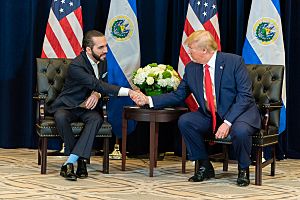
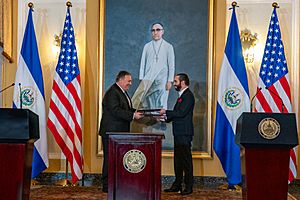
Bukele met with U.S. President Donald Trump on 26 September 2019 in Washington, D.C., where he called on Trump to promote legal migration in an effort to combat illegal immigration, and to maintain the Temporary Protected Status (TPS) policy for Salvadorans living in the United States. He later confirmed on 28 October 2019 that the United States was continuing TPS for Salvadorans.
In June 2019, Bukele stated that his government would no longer recognize Maduro as the president of Venezuela, instead, recognizing Juan Guaidó as Venezuela's legitimate president amidst Venezuela's presidential crisis. The action was welcomed by Ronald D. Johnson, the United States' ambassador to El Salvador. On 3 November 2019, he expelled Venezuelan diplomats, who were appointed by Maduro, from El Salvador. Bukele showed his displeasure when the United States spoke with Maduro in March 2022, accusing the United States of "deciding who is bad and who is good and also when the bad becomes good and the good becomes bad".
In February 2021, Bukele arrived in the United States to meet U.S. President Joe Biden, but Biden refused to meet Bukele. Bukele did not attend the 9th Summit of the Americas of June 2022 due to frustrations over the U.S. government's allegations of corruption and human rights abuses committed by his government.
Relations with China
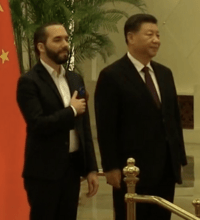
Before becoming president, Bukele accused China of meddling in Latin American politics, especially after El Salvador withdrew recognition of Taiwan. In 2018, however, Félix Ulloa, Bukele's vice president, has stated that El Salvador would not restore relations with Taiwan. In December 2019, Bukele signed a "gigantic" infrastructure agreement with China for an unknown amount. Bukele met with Chinese President Xi Jinping in China in December 2019.
On 9 November 2022, Bukele announced that El Salvador and China had entered negotiations for a free trade agreement between the two countries. China donated fertilizer and wheat flour to El Salvador, and according to a Salvadoran government official, China also offered to buy El Salvador's external bond debt.
Other bilateral relations
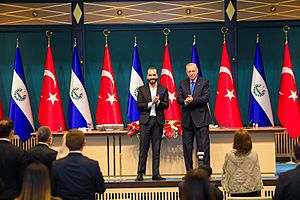
Other world leaders Bukele has met with include Japanese Prime Minister Shinzo Abe in November 2019, Guatemalan President Alejandro Giammattei in January 2020, Turkish President Recep Tayyip Erdoğan in January 2022, and Mexican President Andrés Manuel López Obrador in May 2022. Additionally, Bukele met Hamad Bin Abdulaziz Al-Kawari, the Qatari minister of state, on the day of his inauguration on 1 June 2019, and Saad Sherida al-Kaabi, the Qatari minister of energy, in Qatar in December 2019. Bukele met Tamim bin Hamad Al Thani, the emir of Qatar, in El Salvador on 13 September 2023.
2024 re-election campaign
On 1 May 2021, the Legislative Assembly controlled by Bukele substituted the five justices of the Constitutional Tribunal of the Supreme Court. On 31 August 2021, the Legislative Assembly passed a number of bills, including one that forced the departure of all judges over the age of 60 or those having served over 30 years, affecting about a third of the judiciary. A few days later, on 3 September 2021, the newly appointed Supreme Court ruled that the president is eligible to serve two consecutive terms in office, overturning a previous ruling 2014 stating that presidents must wait ten years until being eligible to run for re-election. Constitutional lawyers argue that immediate re-election violates the country's constitution. The court ruling allows Bukele to run for re-election in the 2024 general election. The Supreme Electoral Court accepted the court's ruling.
The ruling was protested by both ARENA and the FMLN, with a representative of ARENA calling the ruling a "precursor to a dictatorship", and a representative from the FMLN stating that the state is serving only one person, referring to Bukele. The ruling was also condemned by the U.S. government, as stated by Jean Elizabeth Manes, the chargé d'affaires of the United States to El Salvador, claiming that the ruling was "clearly contrary to the Salvadoran constitution". According the Manes, the ruling was a direct result of the legislature replacing the judges of the Supreme Court in May 2021. José Miguel Vivanco, the executive director of the Americas Division of Human Rights Watch, stated that El Salvador was heading down the same path as Honduras and Nicaragua in allowing presidents to be reelected, adding, "democracy in El Salvador is on the edge of the abyss".
During a speech celebrating the country's 201st anniversary of independence from Spain on 15 September 2022, Bukele officially announced that he will be running for re-election in 2024. Constitutional lawyers criticized his announcement, stating that presidential re-election violates "at least" four articles of the country's constitution. Polling conducted after his announcement indicate that around 90 percent of Salvadorans would support Bukele's re-election campaign.
On 1 June 2023 during a speech celebrating his fourth year in office, Bukele issued a proposal to the Legislative Assembly to reduce the number of municipalities from 262 to 44 and the number of seats in the Legislative Assembly from 84 to 60. On 7 June 2023, the Legislative Assembly passed his approval to reduce the seats in the Legislative Assembly.
On 26 June 2023, Bukele and Ulloa officially registered their pre-candidate statuses with Nuevas Ideas to run as president and vice president, respectively. On 9 July 2023, Nuevas Ideas officially nominated Bukele and Ulloa as their presidential and vice presidential candidates, respectively. On 26 October 2023, Nuevas Ideas officially initiated the process to register Bukele and Ulloa's candidacies, the last possible day to do so. On 3 November 2023, the TSE officially registered their candidacies amidst various requests made to the TSE to reject Bukele's candidacy.
On 28 November 2023, Bukele announced that he would formally request a presidential leave of absence from the Legislative Assembly before 1 December in order to remain eligible for re-election. Bukele would be relieved of his duties and be replaced by an acting president. Prior to this announcement, popular speculation believed that Bukele would be succeeded by his younger brother Karim, however, Karim has denied that he would replace Bukele.
On 30 November 2023, Bukele announced that he would request a license from the Legislative Assembly to run for re-election in the 2024 presidential election, as established in article 152, paragraph 1 of the Constitution of El Salvador. The license come into effect from 1 December 2023 to 31 May 2024, it would imply that Bukele would temporarily leave the presidency while he participates as a candidate in the elections scheduled for 4 February 2024.
According to the line of succession established and requested by Bukele to the Legislative Assembly, Claudia Juana Rodríguez de Guevara would take over as acting president during Nayib Bukele's period of license. Rodríguez would become the first woman to occupy the presidency of the Central American nation, although on an interim basis.
Presidential approval rating
Despite being described as an autocrat, a caudillo, an authoritarian, and a strongman, and despite proclaiming himself as the "Dictator of El Salvador", the "coolest dictator in the world", and the "Emperor of El Salvador", by way of irony by the accusations, Bukele has retained a high approval rating throughout his presidency, making him the most popular president in Salvadoran history. He is considered by some journalists to be one of the most domestically popular world leaders and heads of state due to his approval ratings hovering around 87 percent.
Anti-corruption campaign
In September 2019, Salvadoran President Nayib Bukele established the International Commission Against Impunity in El Salvador (CICIES), an anti-corruption commission to combat corruption and white-collar crimes. CICIES was jointly operated by the Salvadoran government and the Organization of American States (OAS), and it cooperated with the National Civil Police (PNC) to form an anti-corruption unit. Bukele dissolved CICIES in June 2021 after the OAS named Ernesto Muyshondt as an anti-corruption advisor; Ernesto Muyshondt was accused by the Salvadoran government of electoral fraud and illicit negotiation with gang members to vote for the Nationalist Republican Alliance (ARENA) during the 2014 presidential election.
In 2022, the last complete year before the war against corruption was announced, Transparency International's Corruption Perceptions Index (CPI) gave El Salvador a score of 33 out of 100 and ranked it 116th out of 180 countries. According to an opinion poll conducted by CID-Gallup in February 2023, only 4 percent of Salvadorans considered corruption to be the most pressing issue facing the country.
Bukele's administration is often criticized by declaring government's expenses as reserved information. Bukele's declaration of assets was declared confidential. During the state of emergency, active since 27 March 2022, the executive branch is allowed to manage funds while bypassing Law of Acquisitions and Procurement of the Public Administration.
Personal life
Family
Bukele was born into a Christian household, although his father converted to Islam later in life. As the son of a Muslim father and a Christian mother, Bukele's religious beliefs were a controversial subject in the 2019 election, with an image surfacing showing Bukele praying at the mosque in Mexico City. In February 2018, The Times of Israel published an image of Bukele "in deep reflection at the Western Wall in Jerusalem's Old City". Bukele has three younger brothers—Karim, Yusef, and Ibrajim—as well as four half-sisters and two half-brothers on his father's side of the family.
Bukele has publicly stated he considers himself a believer in God first rather than religion. In a 2015 interview he said that "I am not a person who believes much in the liturgy of religions. However, I believe in God, in Jesus Christ. I believe in his word, I believe in his word revealed in the Holy Bible. And I know that God does not reject anyone because of their origins".
He married Gabriela Rodríguez, a psychologist and educator, on 6 December 2014. In 2018, Bukele told the Mayor of Jerusalem, Nir Barkat, that Rodríguez has "Jewish-Sephardic blood". The couple has two children, his first born, Layla, was born during Bukele's presidency on 15 August 2019. The couple's second child, Amineah, was born on 8 November 2023.
Cultural activities
Bukele has promoted surfing as a part of El Salvador's tourism market. El Salvador hosted the 2021 and 2023 ISA World Surfing Games.
In January 2023, Bukele announced that El Salvador would host the Miss Universe 2023. He stated, "I am deeply honored to announce that El Salvador will host the next Miss Universe pageant at the end of this year. El Salvador is a country with great beauty, volcanoes, exquisite coffee and we have become the safest country in Latin America". The last time El Salvador hosted the beauty pageant was in 1975. At the pageant, Bukele stated that "Miss Universe has given us the opportunity to show the world what we are capable of. Thank you for choosing to be part of El Salvador's rebirth".
Political views
In September 2012, shortly after being elected mayor of Nuevo Cuscatlán representing the left-wing Farabundo Martí National Liberation Front (FMLN) party, Bukele described himself as being part of the "radical left". During his presidency, he has adopted conservative policies. However, one of his campaign slogans is "public services should be better than private ones". Bukele's political views have sometimes been referred to by some journalists as the ideology of "Bukelism". He has been compared to Donald Trump for his style of government, rhetoric, and criticism of the press.
Public transport
Bukele promised to sanction bus carriers that increase the rates established by law. Elements of the Police were deployed in different parts of the country to guarantee compliance with the regulations. During his presidential campaign, Bukele proposed the construction of a new airport in the east of the country to relieve congestion from El Salvador International Airport and bring an economic boost to the country's east. On 26 April 2022, the Legislative Assembly passed a law to begin construction of the Airport of the Pacific and the Train of the Pacific. The new rail network will be 332 miles (535 kilometers) long, and the new airport will be 126,530 square feet (11,755 square meters) in size in La Unión.
Social issues
Bukele has stated that he is opposed to same-sex marriage and believes marriage is between "a man and woman".
Emigration
In an interview with Tucker Carlson Tonight on Fox News, Bukele attributed mass emigration from Central America to the United States to the region's "lack of economic opportunity" and "lack of security", and described the status quo as "immoral", arguing that emigration not only strains the United States, but also impedes domestic efforts to improve living conditions in El Salvador. In an interview with VICE News' Krishna Andavolu shortly after his inauguration, Bukele stated, "I share the same concern President Trump [has with] immigration, but for different reasons. [...] He doesn't want our people to go; I don't want our people to leave".
Electoral history
| Year | Office | Type | Party | Main opponent | Party | Votes for Bukele | Result | Swing | |||||||
|---|---|---|---|---|---|---|---|---|---|---|---|---|---|---|---|
| Total | % | P. | ±% | ||||||||||||
| 2012 | Mayor of Nuevo Cuscatlán | General | FMLN–CD | Tomás Rodríguez | ARENA | 2,862 | 51.67 | 1st | N/A | Won | Gain | ||||
| 2015 | Mayor of San Salvador | General | FMLN–PSP | Edwin Zamora | ARENA–PCN | 89,164 | 50.27 | 1st | N/A | Won | Gain | ||||
| 2019 | President of El Salvador | General | GANA | Carlos Calleja | ARENA–PCN–PDC–DS | 1,434,856 | 53.10 | 1st | N/A | Won | Gain | ||||
| 2024 | President of El Salvador | General | NI | To be determined | |||||||||||
See also
 In Spanish: Nayib Bukele para niños
In Spanish: Nayib Bukele para niños


